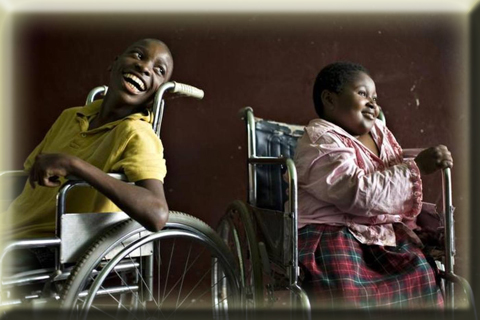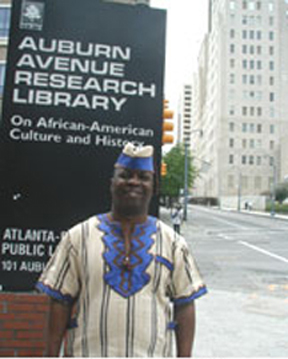GOL’s Message to the Blind and Others With Disabilities in Liberia
By Dr. Sakui W. G. Malakpa
Professor, University of Toledo
The Perspective
Atlanta, Georgia
November 21, 2019
 |
|---|
 |
|---|
| Dr. Sakui W. G. Malakpa |
Apart from being a founding member of both the United Nations and the African Union (formerly the OAU), Liberia is a signatory to a variety of international conventions relative to gender equality and human rights. Regarding people with disabilities, Liberia was applauded eight years ago when she ratified The International Convention on the Rights of Persons with Disabilities, the first human rights treaty negotiated by the United Nations in the 21st century. Liberia also signed the optional protocols of the Convention.
Generally referred to as the UN Convention on the Rights of People with Disabilities (UNCRPD), the Convention was adopted on December 13, 2006 by the UN General Assembly. The Convention requires states that ratify it to enact laws and other measures to improve the rights of people with disabilities and abolish legislation, customs and practices that discriminate against such persons
https://www.un.org/development/desa/disabilities/convention-on-the-rights-of-persons...
The binding Convention begins with a 25-point preamble which, among others, recalls “the principles proclaimed in the Charter of the United Nations which recognize the inherent dignity and worth and the equal and inalienable rights of all members of the human family as the foundation of freedom, justice and peace in the world.” It acknowledges previous UN human rights declarations and covenants. It emphasizes the indivisible human rights, independence, full societal participation, and the inclusion of persons with disabilities in policymaking (especially policies that affect them). The preamble further recognizes that disability is an evolving concept and that people with disabilities, diverse in number and need, should not be targets of any form of discrimination. This point is emphasized as the preamble recognizes that people with disabilities “continue to face barriers in their participation as equal members of society and violations of their human rights in all parts of the world.” In addition, the preamble stresses the promotion of the human rights and full participation of persons with disabilities as this “will result in their enhanced sense of belonging and in significant advances in the human, social and economic development of society and the eradication of poverty.” Likewise, the preamble recognizes the subjection of people with disabilities to multiple forms of discrimination. Also recognized are the rights of the child and consequently, children with disabilities should not be deprived of their human rights and fundamental freedoms. Recognized further is “the fact that the majority of persons with disabilities live in conditions of poverty” and therefore a “critical need to address the negative impact of poverty on persons with disabilities.” To that end, the preamble underscores “the importance of accessibility to the physical, social, economic and cultural environment, to health and education and to information and communication, in enabling persons with disabilities to fully enjoy all human rights and fundamental freedoms.”
Finally, the preamble expresses conviction that a “convention to promote and protect the rights and dignity of persons with disabilities will make a significant contribution to redressing the profound social disadvantage of persons with disabilities and promote their participation in the civil, political, economic, social and cultural spheres with equal opportunities, in both developing and developed countries.” Based on this conviction, the Convention outlines 50 articles. Articles 1-32 point out the key issues of concern; these range from the purpose of the Convention to equal rights and opportunities as well as education, health, and equal justice. These articles also cover employment alongside full and non-discriminatory social, cultural, and political participation. Articles 33-50 deal with logistical issues: the establishment of a monitoring committee, the role of the committee, ratification and subsequent obligation, reporting procedures, denunciation, and amendments
https://www.un.org/development/desa/disabilities/convention-on-the-rights-of-persons...
When the Liberian Legislature ratified The Convention and subsequently, the president of Liberia signed it into law, the convention was finally deposited at the UN Headquarters in New York on July 26, 2012 (The Informer Newspaper, August 7, 2012). In the same year, I was privileged to serve on the Vision 2030 Committee where I advocated, among other issues, the rights of persons with disabilities in Liberia. In doing so, it was a delight to note that Liberia had signed and ratified other international treaties and conventions regarding the rights of all people, including people with disabilities. These included “the UN Convention on the Rights of the Child, the African Charter on Human and People’s Rights, the Convention on the Elimination of All Forms of Discrimination against Women – all of which make some reference to protecting the rights of persons with disabilities to fair treatment” (https://www.sida.se/.../disability/rights-of-persons-with-disabilities-liberia.pdf).
In addition to international treaties and conventions, the government of Liberia has repeatedly recognized and underscored the legal rights of people with disabilities. To cite a few examples, Article 15(b) of the 1986 constitution of Liberia unequivocally emphasizes universal rights to education. Likewise, in 2005, the National Legislature passed a Disability act leading to the establishment of the Liberian National Commission on Disability. Furthermore, the NATIONAL HUMAN RIGHTS ACTION PLAN OF LIBERIA (NHRAP) 2013-2018 proposed action plans that included the need for the government to “harmonize educational policies and plans to mainstream the right to education of persons with disabilities at all levels (teacher training, accessible infrastructure, accessible facilities, assistive devices, etc.).” According to Mr. Beyan Kota, president of the Christian Association of the Blind, these local efforts were reaffirmed in the new development policy of the government: “the pro-poor agenda for prosperity and development,” which was adopted in July 2018 (Smart News Liberia, Nov. 2, 2019).
Despite the preceding laudable efforts by the government of Liberia to affirm and uphold the rights of all citizens to education, including people with disabilities, The Liberian National School for the Blind has not reopened for a new academic year. This lamentable situation continues although the school expects to enroll up to seventy-five students this year (FrontPage Africa, Wed. Nov. 13, 2019).
Indeed it is sad that the government of Liberia, GOL, has failed to reopen the national school for the blind on grounds that it (GOL) has no money although the United States Agency for International Development, USAID has built a girls dormitory that can accommodate up to thirty students.
To the best of our knowledge—and we stand to be corrected—no government school in Liberia has remained unopened because the government has no money to do so. True, there are issues of nonpayment of teachers, among others but officially, government schools are opened. Thus, failure of the government to reopen the national school for the blind sends many messages to people with disabilities in Liberia especially those who are blind or visually impaired. Essentially, this special group of Liberians is being told that they do not matter; that they do not count; that local and international legal mandates in their favor do not matter. This confirms what the Swedish International Development Agency, SIDA, observed in Liberia. Its report states that in Liberia, “Disabilities are generally perceived to constitute a liability to the public, and are excluded from public debate. Discrimination is a structural problem, caused by stereotypes, negative and hostile attitudes, particularly with regard to persons with intellectual disabilities and mental health difficulties (https://www.sida.se/.../disability/rights-of-persons-with-disabilities-liberia.pdf).
The present situation of the Liberian National School for the Blind confirms the SIDA observation. Comparing the school to a nearby school (DAS) owned by the current Minister of Education, FrontPage Africa Newspaper describes the situation accurately:
On the other hand, the Liberian School for the Blind remains in shambles as the hope of 75 students, who are desperate to learn the brail, remains in limbo. A portion of the school fence has already fallen, the roof is leaking, the computer laboratory remains non-functional, many teaching and support staff are off government’s payroll, while food rations are now extinct. The swings and merry-go-rounds gifted to the vulnerable students by a humanitarian organization couple of years back are now corroded. The compound continues to experience flood during the rainy season due to the lack of a dredging and covert system. And, unlike DAS, there is no bus to commute students to and from school.
The marginalization of the blind and others with disabilities in Liberia, with its demoralizing message, ought to be a concern to all people concerned with equality and human rights of all Liberians. Unfortunately, with the exception of FrontPage Africa Newspaper, we do not hear clamors against same. This is equally hurtful. It reminds us of one of Dr. Martin Luther King’s statements as he struggled against racial injustice. In that struggle, the civil rights leader said it was not just the vitriolic words of the bad people but the “appalling silence” of the good people.
While we call upon human rights advocates to clamor against the neglect and injustice meted against the blind and others with disabilities in Liberia, we particularly call on the Ministry of Education to abide by its local and international legal mandates and reopen the Liberian National School for the Blind. These students have rights to education like any other students throughout the nation and this right is guaranteed by law. Failure to do so not only sends a demoralizing message to the disability community in Liberia but a message to the international community regarding the character of the government itself.